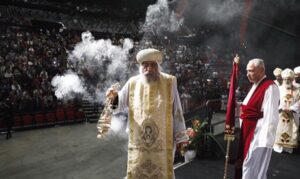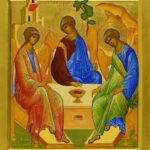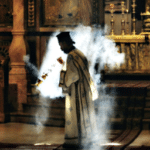The importance of sacraments
Author: Yitzhak
What is a sacrament?
The word ‘Sacrament’ in the context of Orthodoxy means the “Holy Mysteries”.
The Orthodox Church has seven main Sacraments, and the main reason we have a “Church” is to brings people together so that they can partake in the sacraments together as a congregation.
So why are these ‘Holy Mysteries’ so important?
These sacraments are for Orthodox Christians, where God dutifully gives out Himself through the Holy Spirit. This doesn’t mean that God doesn’t show Himself to us in other ways; it just means that these seven ways are where you will always find the Holy Spirit always working . The sacraments are meant to be done together by the people – as one unit with the priest/bishop as the Captain of this unit. A sacrament cannot be done alone; in the same way that a newspaper is useless unless it is read, a Youtube video doesn’t do much unless it is being watched, so too are these sacraments useless to the Orthodox Christian unless they directly partake in them.
These are the seven main sacraments of the Orthodox Church:
Baptism
The Sacrament of Baptism brings us initially into the Church or the Body of Christ, and is our introduction to the life of an Orthodox Christian. Water is a natural symbol of cleansing and renewell of life so when the priest does the three-time immersion in the water in the Name of the Holy Trinity, you are re-born into Christ. Baptism is one’s public identification with Christ His death and victorious resurrection and can only be done once in a person’s lifetime.
Note:
Baptism of babies and toddlers – Following the custom of the early Church, Orthodoxy encourages the baptism of infants. The Church believes that the Sacrament is bearing witness to the action of God who chooses a child to be an essential member of His people. From the day of their baptism until they grow up, children are expected to mature in the life of the Spirit, through their family and through the Church.
Baptism of adults is practised when there was no previous baptism in the name of the Holy Trinity as this can only be done once.
Chrismation
The Sacrament of Chrismation (Confirmation) immediately follows baptism and is not delayed until a later age. As the ministry of Christ was enlivened by the Spirit, and the preaching of the Apostles strengthened by the Spirit, so is the life of each Orthodox Christian sanctified by the Holy Spirit. Chrismation, which is often referred to as one’s personal Pentecost, is the sacrament which imparts the Spirit in a special way.
In the Sacrament of Chrismation, the priest anoints the various parts of the body of the newly-baptized with Holy Oil saying: “The seal of the gifts of the Holy Spirit.” The Holy Oil, which is blessed by the bishop, is a sign of Consecration and strength. The sacrament emphasizes the truths that not only is each person a valuable member of the Church, but also each one is blessed by the Spirit with certain gifts and talents. The anointing also reminds us that our bodies are valuable and are involved in the process of salvation.
Confession
As members of the Church – ‘we have to be the best person we can be’ for one another and, of course, for God. When we sin, or relationship with God starts to become distorted. Sin is ultimately alienation from God and from our true self which is created in God’s image and likeness.
Confession is the sacrament through which our sins are forgiven by God as our relationship to God and others is restored and strengthened. Through the Sacrament, Christ our Lord continues to heal those broken in spirit and restore the Father’s love those who are lost. According to Orthodox teachings, the penitent confess to God and is forgiven by God. The priest is the sacramental witness who represents both Christ and His people. The priest is viewed not as a judge, but as a physician and guide and Christ is the medicine. It is an ancient Orthodox practice for every Christian to have a spiritual father to whom one turns for spiritual advice and counsel.
Confession can take place on any number of occasions. The frequency is left to the discretion of the individual. In the event of grave sin, however, confession is a necessary preparation for Holy Communion.
Marriage
God is an active participant in our lives. It is He who joins a man and a woman in a relationship of mutual love. The Sacrament of Marriage bears witness to His action. Through this sacrament, a man and a woman are publicly joined as husband and wife. They enter into a new relationship with one another, God, and the Church. Since Marriage is not viewed as a legal contract, there are no vows in the sacrament.
According to Orthodox teachings, Marriage is not merely a social institution, but is an eternal vocation of the kingdom. A husband and wife are called by the Holy Spirit not only to live together but also to share their Christian life so that each of them, with the aid of the other, may grow closer to God In the Orthodox Marriage Service, after the couple have been married and have exchanged rings, they are crowned with “crowns of glory and honour” signifying the establishment of a new family under God. They are now considered one unit with Christ as its head.
Priesthood
The Holy Spirit preserved the continuity of the Church through the Sacrament of Holy Orders. Through ‘Ordination’, men who have been chosen from within the Church are set apart by the Church for special service to the Church. Each one is called by God to guide His people as pastor, teacher, and a representative of the parish before the Altar. Each is also a living icon of Christ among His people. According to Orthodox teaching, the process of ordination begins with the local congregation; but the bishop alone, who acts in the name of the universal Church, can complete the action. He does so with the invocation of the Holy Spirit and the imposition of his hands on the person being ordained.
Following the custom of the Apostolic Church, there are three major orders each of which requires a special ordination. These are bishop, who is viewed as a successor of the Apostles, Priest and Deacon, who act in the name of the bishop. Each order is distinguished by its pastoral responsibilities. Only a Bishop may ordain a priest.
For now, just remember that there are other titles and offices are associated with the three orders which will be discussed . The Orthodox Church permits men to marry before they are ordained but they cannot get married after they are ordained and this is usually for monks in monasteries etc. (in later articles, we will discuss what specifically the Bishops and the priests do)

Anointing of the sick
When one is ill and in pain, this can very often be a time of life when one feels alone and isolated. The Sacrament of the Anointing of the Sick, or ‘Holy Unction’ as it is also known, remind us that when we are in pain, either physical, emotional, or spiritual, Christ is present with us through the ministry of his Church. He is among us to offer strength to meet the challenges of life and even the approach of death.
As with Chrismation, oil is also used in this sacrament as a sign of God’s presence, strength, and forgiveness. After the reading of seven epistle lessons, seven gospel lessons and the offering of seven prayers, which are all devoted to healing, the priest anoints the body with the Holy Oil. Orthodoxy does not view this sacrament as available only to those who are near death. It is offered to all who are sick in body, which is for the body, soul and mind.
Eucharist
The Holy Eucharist, which is known as the Divine Liturgy, is the central and most important worship experience of the Orthodox Church. Often referred to as the “Sacrament of Sacraments”, it is the Church’s celebration of the Death and Resurrection of Christ offered every Sunday and Holy day. All the other Sacraments of the Church lead toward and flow from the Eucharist, which is at the centre of the life of the Church. The previous pamphlet in this series was devoted to the meaning and celebration of the Eucharist in the Orthodox Church.
Conclusion
In conclusion, the sacraments are there to be taken, transformed by them and for you to grow closer to God and grow as a person. This church is entirely voluntary, so that means no one is going to force you to do something that you don’t want. But it is always available for everyone who so chooses to take this beautiful path.



